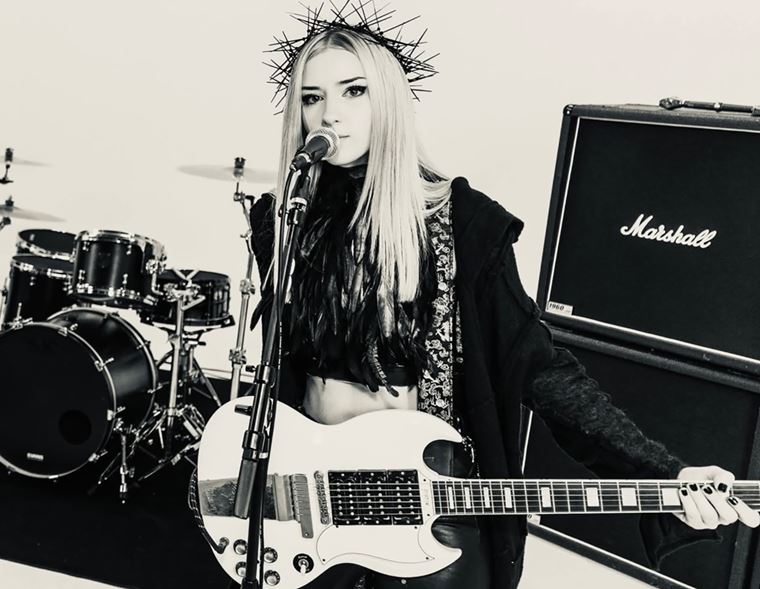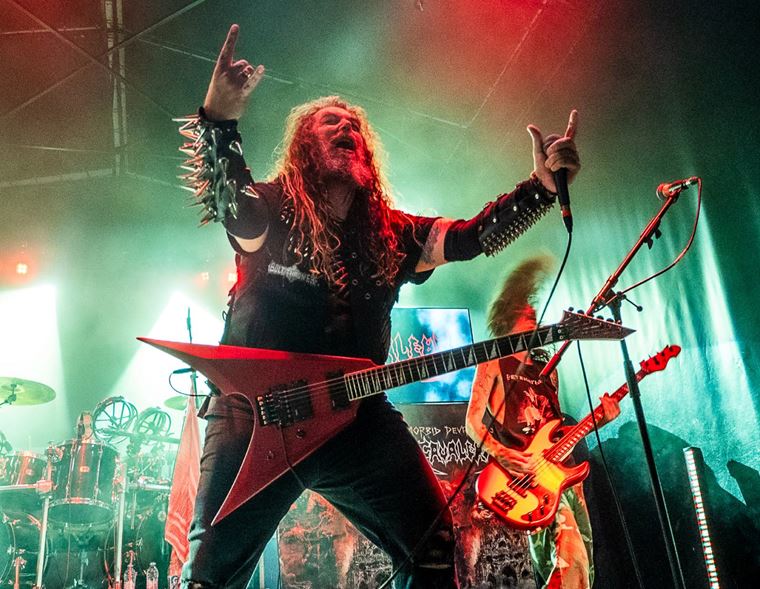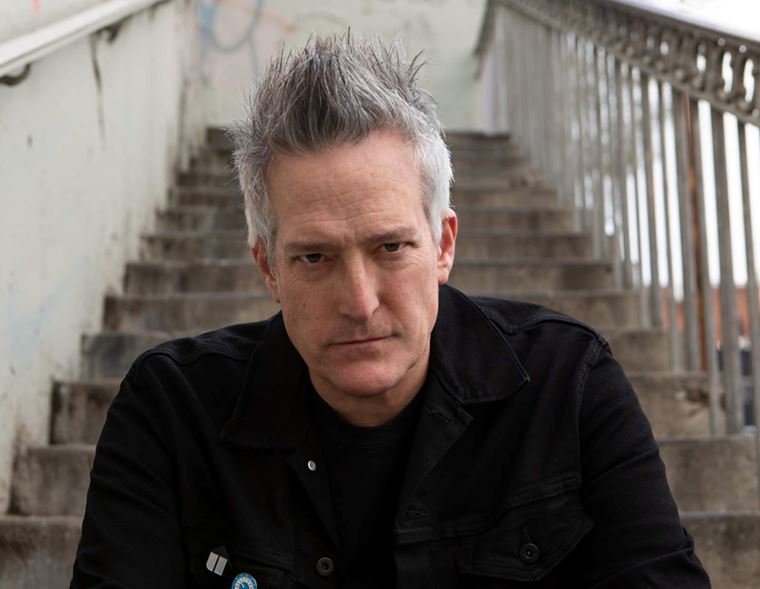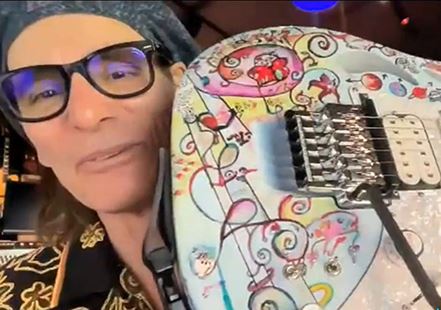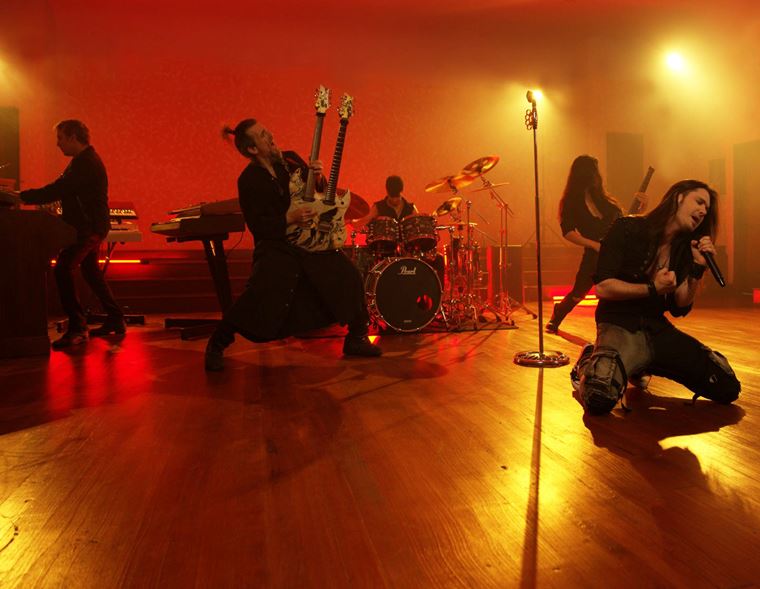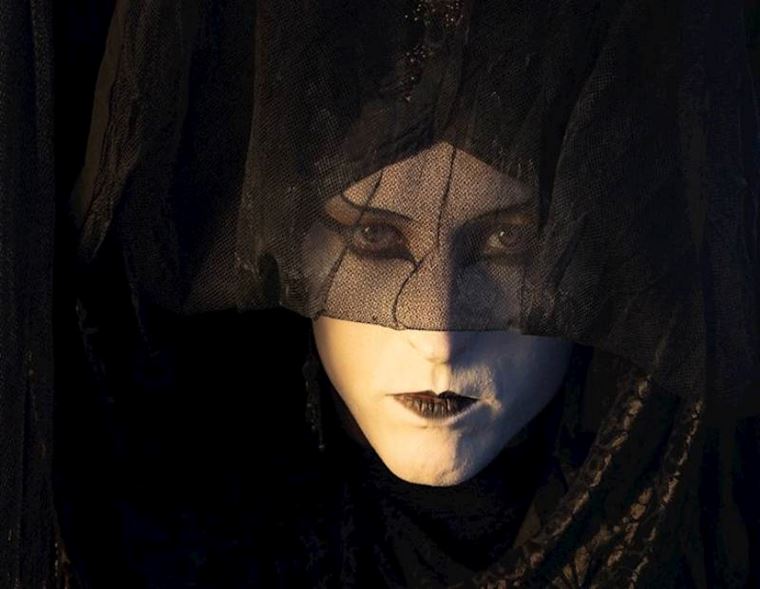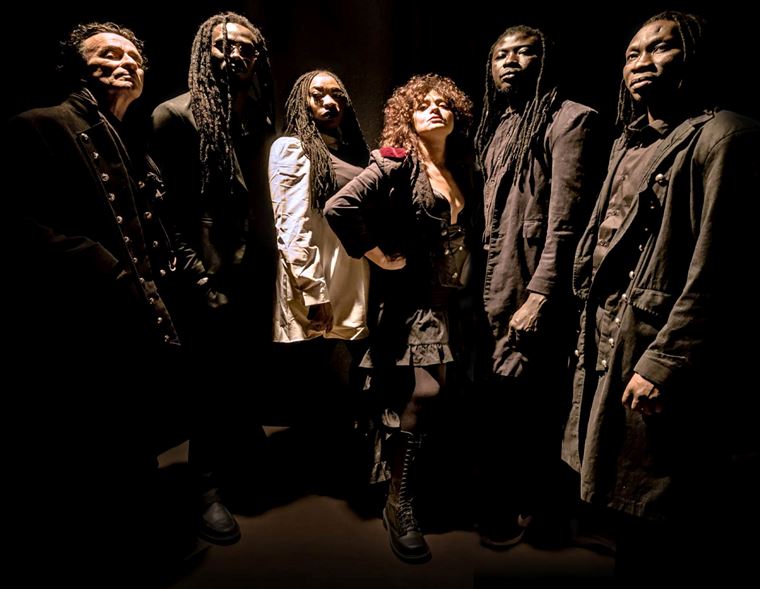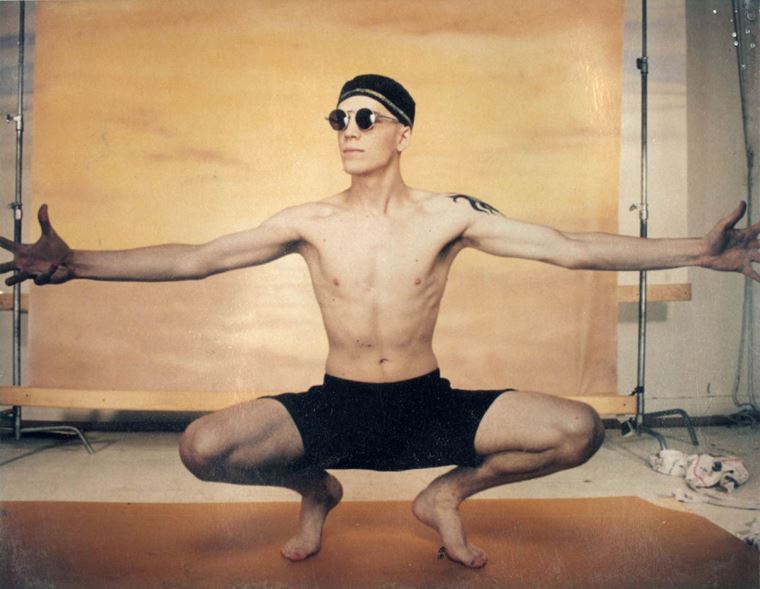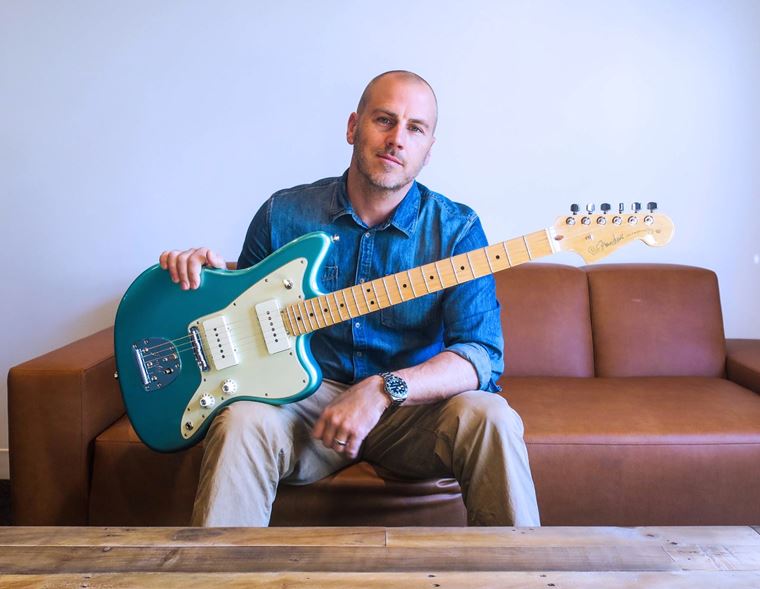SCALPING Interview Exclusive! Bristol's Rock/Techno Crossover Stars Bring It!
Published on 05 May 2022
SCALPING don’t exactly hold back. Whether in the studio, on stage or indeed right here in this exclusive interview, on the eve of their debut album release, Void. Bristol band SCALPING have a powerful sound that combines cutting edge technology with downtuned metal riffing, blurring the line between rock and dance in a giddily inclusive way. Their sound brings together textural soundscapes, layers of percussion and a distinctly dystopian future vista, melding a myriad of musical reference points but always surrendering to an overall groove and aesthetic from electronic music.
In other words, it sounds fresh and pretty thrilling.
We came across SCALPING recently, and were not only hugely impressed by their sound but also intrigued by the fact that they are signed to Houndstooth, the label owned by Fabric, the iconic club in London. What were they doing with a band that played guitar, bass and drums?
Knowing that SCALPING’s oeuvre is actually as a full-on live act, we really wanted to learn more. How did they recreate such abrasive and rhythmic music with a more-or-less traditional guitar band line up? What machines were they using to describe their dancey future odysseys? It’s not so much a sound we’ve never heard before as it's a sound that not many people ever try to achieve, even though the results are quite obviously exciting. There was something evidently happening here, and we wanted to get to the truth!
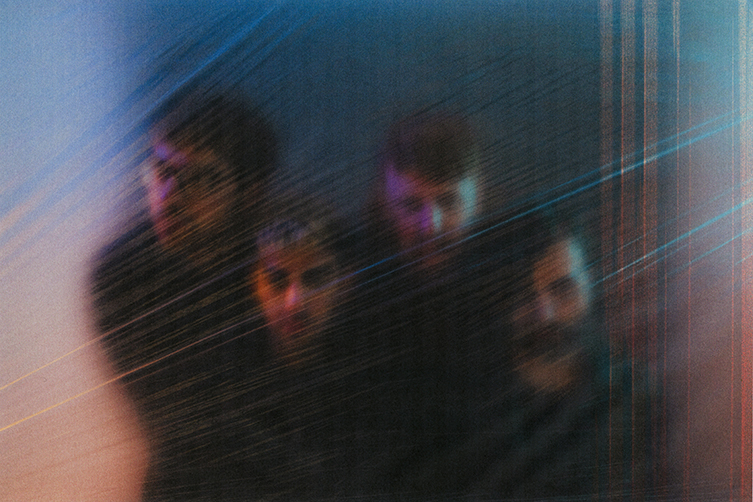
Learning that the Void album drop was imminent, we reached out to the band, who were happy to oblige our explorative curiosity. We connected with guitarist Nick Berthoud and bassist/principal co-writer James Rushforth on Zoom, where we enjoyed a particularly energetic and in-depth conversation. Both men proved to be entertaining and forthright, with James bringing a layer of pleasant confrontation to the party (you’ll see what we mean when you read the piece!), though always with a friendly smile. We found them both quite lovely, and more than happy to reveal the secrets behind their complex, unorthodox sound.
Pedal fanatics are in for a good time here, as is anyone with a thirst for doing things outside the box. Enjoy the full chat below, and be advised that these two do not hold back on their opinions!
SCALPING Interview
guitarguitar: So, I heard SCALPING probably less than two weeks ago and thought you sounded absolutely amazing, so I’m excited about talking to you!
Nick Berthoud: Nice one man!
GG: So, why don’t we start with your background prior to you joining SCALPING: previous bands, that kind of thing?
NB: I’ve played in a fair few bands that have been varied, on varied instruments as well. This is actually the first band I’ve played guitar in for probably 7 or 8 years. I played bass in garage rock bands, folky things. I played electronic synths and drum machines in a kinda New Wave funky thing just before SCALPING. It’s worth noting that I joined SCALPING a bit later, so James is from the beginning.
But yeah, I learnt the guitar by playing metal but I personally haven’t played in a metal band: this is the most ‘metal’ project I’ve played in to date, even though it’s obviously in the dance world as well. I was really into Metalcore and Nu Metal in my teens. I learned the open strings in Drop C: I didn’t know them in standard tuning!
GG: Haha, that’s good!
NB: I only knew how to tune my guitar to CGCFAD for years! But yeah, I have a background in various contexts, yeah.
GG: Okay, brilliant, yeah! And, James, you’re one of the original founding members of SCALPING, yeah?
James Rushforth: Yeah, yeah, that’s right. SCALPING is sort of me trying to marry electronic and guitar music together in a not naff way. Still working it out!
GG: I’m wondering about how your jobs correlate within the band. The overall sound is so interesting and dynamic, that one of my questions was going to be: do each of you do more than your requisite jobs of guitar and bass in the band? Well, we’ll get to that! James, do you have a similarly disparate background prior to SCALPING?
JR: Oh, massively yeah. I think that before I did this project, Isaac (Isaac Jones, SCALPING drummer) and I were both session musicians and we played pop for a major label singer-songwriter. By the age of 24, we’d already kind of like been through the grinder once. So, SCALPING was the project we’d set up during that time basically when we were getting paid. I went to BIMM (British and Irish Modern Music Institute - Ray), Alex, who does electronics, went to BIMM. I didn’t pass because I already had a job in music before I graduated so I didn’t really care at that point! Also, just being exposed to music in Bristol, which is the melting pot of everything. It’s just so vast: each individual scene isn’t enough for you to be, like…I dunno, you just get mixed in with everything, I think. Especially for someone like me, who grew up in a village in the middle of nowhere and thought throughout my teenage years that nobody cared for music as much as I did; I was never going to meet anybody, and then you get to a city and it’s like, ‘Oh my god, you’re all here! I never thought it was going to be like this!’
GG: As a listener, when I listen to SCALPING, there’s a lot of references that I’m hearing, but that doesn’t mean that any of you guys are necessarily into those. Is there a point, like a nucleus, that you all agree on? Things that all touch on the aesthetic that you’re all working towards?
JR: Deftones is the biggest one, because I don’t think, to be honest, there are many bands in the world that have the scope and the yin yang thing going on with beauty and crushing heaviness, but also with the element of forward-thinking and technology. Even then, they’re still in that whole band format, which is getting a bit outdated. But the main thing as well, the kinda main thing that I take issue with in guitar music, is like sound system culture in Bristol, and basically experiencing when guitar people go ‘Oh, it's loud!’ and this constant fetishisation of loudness, and it's like, fuck you! (laughs) Go to St Paul’s Carnival, or go and watch like a Deep Medi Takeover and we’re gonna show you, we will redefine loud for you, away from your fucking 4x12’s, which are cute and tiny. That’s the main thing, my main issue with guitar culture. Especially going to see Sunn0))) or whatever. Don’t get me wrong: Sunn0))) is fucking loud but it’s a different kind of loud. Sine wave sub bass, just literally how physics works, it’s gonna feel louder, just because of how pure it is.
"You've got to lose your ego and forget about you playing your part: it's not about that at all. That's really important." (James Rushforth)
What we’re interested in is what happens when you start merging sequenced music with the imperfection of human timing, with the volume and also - something which excites me so much more than guitar music - about production and sound systems. The chasing of technology in clubs and sound systems, like, headroom and just this constant pushing of capabilities, rather than just like a fucking tube amp. It’s like, come on! Come on! There’s so much more; we’ve got so much more to work out and I feel like we’re playing catch up. It’s so easy to break the mould when you take a few of these things and just start smashing them together. Bristol is really the place to explore that, for sound systems and experimental music. It’s literally one of the best places in the world for both of those things. People don’t say it out loud but it’s the truth.
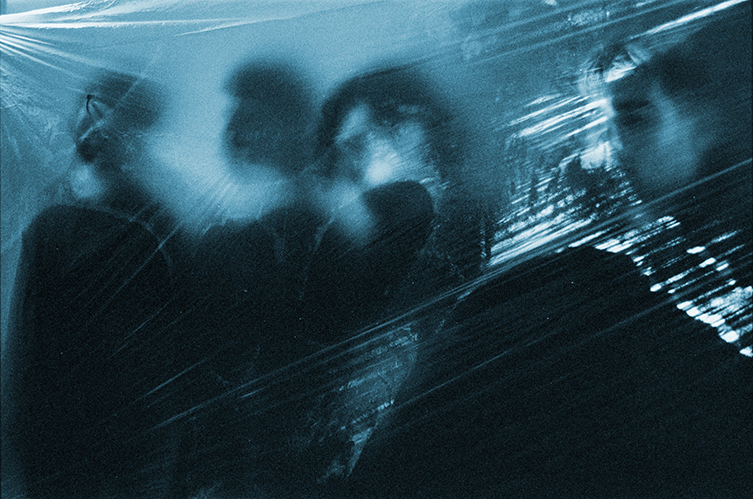
(Photo: Jamie Harding)
NB: Yeah, what James was saying about the scene being massively diverse but quite small feeds in as well in that we’ve obviously gotten into electronic music as a whole and sound system stuff, but all of those people are still hanging out with people who are in punk bands and rock bands, and folk artists and singer-songwriters. It’s not like in London where you have the ‘South London Post Punk Scene’! (laughs) In Bristol, it’s just like musicians hanging out, and it means that all of these influences consciously and subconsciously mesh together within your music. We didn’t have to strictly do an electronic project: it just seemed quite natural to bring all those influences together in a way.
GG: Yeah, all of that is really interesting, and I really like you mentioning the sound system culture. It’s something that guitar circles often don’t have a real understanding of. Frequencies being a specifically different type of ‘loud’ is also something that’s interesting to explore. Now, I’ve yet to see you play live, but I’ve read about this idea that you play a continual set, am I right in saying that?
JR: Yeah.
GG: Both of you are playing fretted, pitched instruments. A lot of SCALPING’s sound isn’t so much about chord changes and melody as it is about…not strictly ‘atonal’, but definitely textural and manipulated sounds that rely more on soundscaping and sound design than ‘note playing’, as it were. So, how do you guys navigate the landscape of a live set, when you are playing traditional instruments on a non-traditional set?
JR: The main thing is, we are playing songs, that’s the short of it. But what we are doing -especially with the album and stuff - is like, we remix our own songs, and we extend sections. We kind of make things as functional as possible because it’s about making you dance and keeping the flow.
"Because I'm using a digital setup, I can do most of the weird shit that's on the record, live." (Nick Berthoud)
Basically, when we’re talking about the atonal thing it’s more about using stuff like modular (synthesis - Ray). We want to use modular. I’m in Leeds with Giant Swan right now and they use modular. When I’m talking to Robin, I say, ‘It’s fine for you when you use these atonal FM percussion and stuff like that, because you’re not having to work in the context of traditional instruments and tuning’. So what we have to end up doing is: okay, you set up your parameters, in the sense that, like, we’ll make the sound first and then look at it through a tuner and it’s half way between a G and a whatever. Then we’ll stick it through Melodyne, work it back out and eventually, everything then gets put onto the Octatrack (Electron Octatrack, top-shelf hardware performance sampler/sequencer - Ray) and then what I think happens is, just the way that’s set out, you are limiting yourself. But what that means is you’re limiting yourself in the sense that you just have to be organised. Everything then ends up in a natural flow anyway, and then we just extend stuff. We just play through songs and mix them together. We have to learn the mixes. Basically, we learn every song individually, and then write the mixes and then practice the mixes, then it’s just rinse and repeat, really.
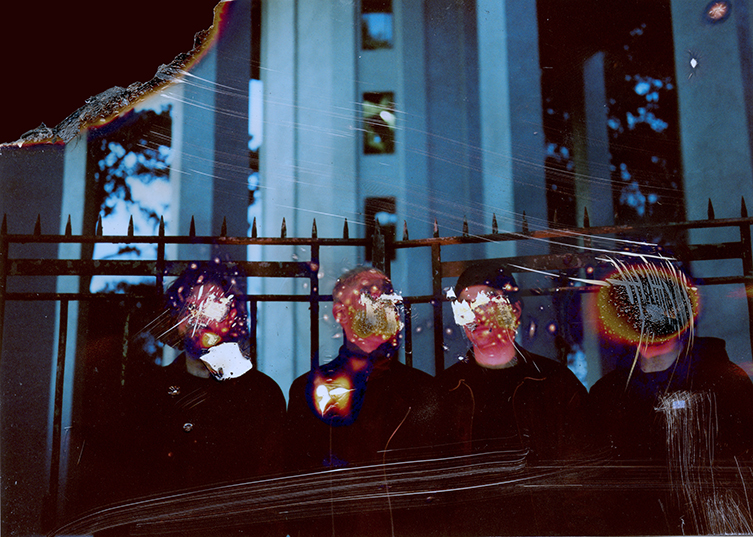
(Photo: we are jam)
We take cues, that’s kinda the main thing. We just get to the point where you know after a certain number of bars that this is probably gonna happen: we all know that the next bit is gonna be this bit, probably.
NB: The parts themselves aren’t improvised live, largely. But we try to keep the amount of time that we play anything for quite flexible. So, like a DJ would vibe off the dancefloor and keep something going longer or not, it’s good to have the option as a band as well. So yeah, when we’re in rehearsals, we’re working out what one member of the band could do to mean ‘I think it’s probably time to move onto the next section’, and that doesn’t have to be any specific member of the band. So, it’s quite a mad process, getting the live show together, because everyone needs to know what everyone else is doing. But, you know, you play together enough, you just know.
GG: Uh-huh, it makes a lot of sense about having cues. That’s really what I was getting at: you're playing for fluidity but you’re listening for cues.
NB: Pretty much, yeah. It’s nice to keep that flexibility live. But yeah, we wouldn’t be able to improvise microtonally live as a band. I think that would turn into something quite chaotic. We’re not writing actual parts on the fly! The cues work well for structural stuff.
GG: Okay, brilliant. In terms of writing the material, is the process democratic? Do you all bring songs to the table? And is there a process where you send files back and forth, working on each other’s music?
JR: So, for the album, which I guess we should put in that context, the whole thing was written without any of us being in the same room. The way we did that was, we planned…basically, there were a lot of spreadsheets (laughs), a lot of spreadsheets. But we planned what vibes we wanted: what boxes we wanted to tick. Obviously, the main thing with this project that I have to keep reiterating to people is that we’re really trying to tread the line between cool and really naff. Because it’s like, if we fuck up, we can end up being so naff, if that makes any sense, because the elements that are going together, and a lot of stuff you see with live electronic music, it can be really cringe! Especially when it’s all guys, and with how nerdy we actually are, this is the first chance we’ve been able to have publicly to kind of address that, which is massively nerdy! (laughs)
So with the writing, especially with the album, it was like a box-ticking exercise. I start the songs, usually, and it’s like throwing stuff at a canvas. With dance music - and this is a thing you don’t have with guitar music - stuff is dictated by tempo. Genre is dictated by tempo, right? So we just go ‘what are the boxes we want to tick stylistically, and what is the message we’re trying to get across?’ That’s step one. This was all because we were working remotely: I don’t know how it’s going to work going forward.
GG: Okay.
JR: And then step two is: now we’ve just got to start throwing stuff at a canvas with tempos but also, we’re not bound by - in the same way that you would be with a DJ or a producer - just because the tempo’s 160, it doesn’t mean it has to be a Footwork track, doesn’t mean it’s gonna be a Jungle track. Because you’ve got the limitations of a live drum kit, you’re always gonna be…it’s the best thing, the easiest thing about being in SCALPING, because there's so much amazing electronic music out there, the moment you start transferring it across to instruments, everyone’s like, ‘Oh, it’s mad!’ Not really. It’s just that most people aren’t even trying to do it with instruments.
"Guitar people are so caught up in the past." (James Rushforth)
To be honest, Isaac, our drummer, is just astonishingly good and so it makes everything so much easier. You throw crazy 160 kick patterns at him and he just brushes it off. All of the stuff that people are trying to make with MIDI, putting in velocity…I’ve got it: I’ve got the best fucking 909 in the game!
It’s such a great thing about this project: making tunes where it sounds like its own thing because you’re reverse engineering this modern, fresh music. Nobody else can be bothered, especially guitar people, who are just so caught up in the past.
GG: I’m sensing a slight hostility towards guitar culture here, which I understand from a certain point of view, but you two are still playing bass and guitar in the studio and live, so you obviously still have love for it! And you said your biggest influence is the Deftones. What’s interesting about SCALPING is the juxtaposition. There’s also a lot of space for guitars and everything else, so how do you guys get your mix of elements, if you like? Nick, do you ever fight for more guitar only for James to say, ‘No, that’s enough?’ How does that work itself out?
NB: It’s quite a natural process, to be honest. I think, because there’s a crossover between our influences and musical loves, there’s effectively quite a clear vision for the direction of the project, really. It feels quite natural: it does come together without too much ‘Oh, I haven’t got enough guitar in’. Also, I think it’s one of those things where you leave your ego behind a bit: if a part doesn’t need guitar, I just don’t play guitar. I don’t mind having two minutes in the set where I don’t play anything because it just doesn’t need it.
GG: Is the guitar sometimes sampled and triggered by one of the other musicians?
NB: Yeah, Alex does that. So, we have an Octatrack and a 404 (Roland SP-404 sampler - Ray) which both trigger guitar at various points. That’s usually when I am playing as well, when we need more guitar parts. There are probably moments where we trigger a unique sound from the record that was a guitar but it’s effected, but it doesn’t happen that much because I’m using a digital setup, so I can do most of the weird shit that’s on the record, live.
GG: Okay, and for the sake of our fellow gear and pedal geeks, can I ask you each in turn to tell me about your live setup, and how it may differentiate from what you recorded with?
NB: Well, all the guitar for the record was recorded direct to the computer. Some feedback stuff was done at Rockfield, maybe?
JR: Yeah.
NB: Various plugins were used. For live, I’ve changed it around recently: I’m actually going to rewire it again this evening, after this. Everything is MIDI controlled by a Morningstar MC8 MIDI controller. I'm using two Line 6 HX Stomps and a Strymon Iridium for amp stuff. I go from guitar into the Chase Bliss and Zvex collaboration Fuzz Factory, called the Bliss Factory, so it’s a Fuzz Factory with MIDI presets and switching. Then I go into the Behringer FZ-2 clone, the SF-300, the doomy fuzz. Then a Digitech reverb which is basically always doing a reverse reverb and it’s always pre-distortion for that kind of noise rock, don’t-play-any-notes, just play open strings and make some horrible noises.
JR: If I can jump in just really quick: the Behringer Super Fuzz, we used a lot across the record, and that’s the one we re-sampled. Just straight DI, the guitar into the fuzz, straight into the DI and it sounds sick as fuck.
NB: Literally, that pedal new is under £20: it is so ludicrous! There’s other stuff on that board that’s mad and that is the one that probably gets used the most, particularly in recording.
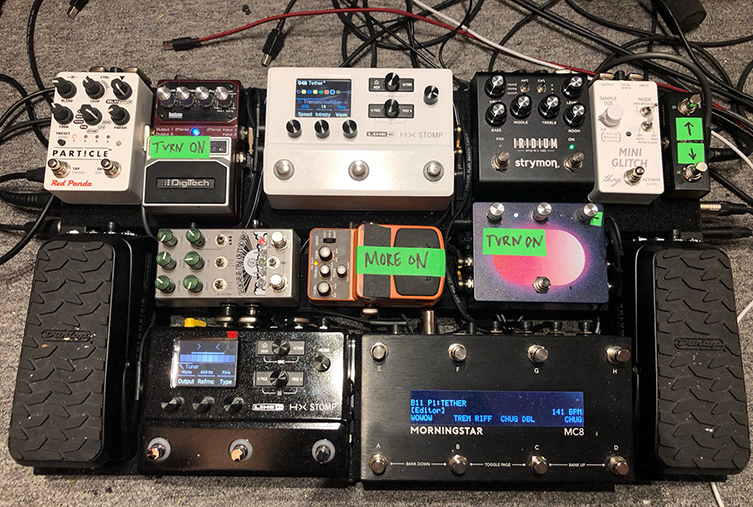
(Photo: Nick Berthoud)
GG: I love it!
NB: Yeah, then there’s this weird glitch pedal, and then it goes into the first HX Stomp, which is doing distortion, modulation and amp - but not cab - modelling. It goes out of that into a Red Panda Particle Delay, then the second HX Stomp is doing mainly general delays and reverbs. The reason I’ve got two HX Stomps and then the Iridium, which is obviously fucking ludicrous, is that in the effects loop I’ve got something which lets me sidechain my guitar live to the kick drum.
GG: Oh, cool!
NB: That has to be last in the chain. I play DI’d to front of house, but also with cabs on stage: not full-range cabs, guitar cabs because getting intentional feedback on stage is a bit weird with full range cabs. With mic simulation coming out of it, it just wasn’t reacting the same way. I’ve got a stereo signal coming out of the second HX Stomp that then splits into four: two get sent to guitar cabs and two get sent to the Iridium, which I’m just using as an impulse response loader for the cab emulation, to then go to the front of house.
GG: That’s quite a complicated rig!
NB: I cannot tell you how confused I’ve gotten, building it! I keep on going, ‘I don’t even know if this exists, but I really want to do it!’ All of the analog pedals are in a MIDI switcher, which I’ve got mounted underneath: there’s quite a lot going on underneath the board as well. I didn’t know that existed: a MIDI switcher without footswitches, so you can put it underneath, and you send it MIDI messages to turn on and off your pedals. It’s made by a company called Disaster Area Design, who’ve been unbelievably nice and helpful over email.
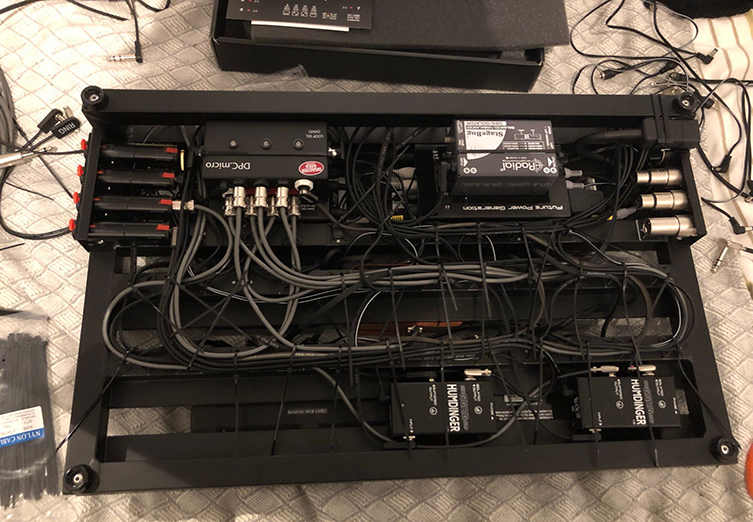
(Photo: Nick Berthoud)
GG: What guitars are you using? I saw in the videos that you seem to be using some sort of Schecter 7 string?
NB: Yeah, I’m using two Schecter Keith Merrow signature 7 strings. They are identical apart from in colour. I tune down to drop F-sharp.
GG: Oh wow, so it’s like an 8 string tuning?
NB: Yeah, basically 8 string tuning but on a 7.
GG: There’s the Deftones influence right there, right?
NB: Yeah, yeah! A hundred percent. (Nick reaches over to grab one of his guitars) This one is the cheaper Keith Merrow one. I think they made one with active pickups and neck-through body and stuff. I had one already and Schecter hooked me up with a backup. They’re really great. The main one is the grey one that they did, and the inlays are from Predator!
"The main thing with the project that I have to keep reiterating to people is that we're really trying to tread the line between cool and naff." (James Rushforth)
GG: That works for me! Okay, James, it’s your turn!
JR: It’s my turn! So…
NB: I’ll warn you: his rig is probably more complicated than mine!
GG: Haha, okay, I’m preparing myself!
JR: I guess it is, but there’s less of it. I’ve had a massive board before, and with bass, you actually don’t fucking need it, especially when you’re doing dance music. What you do need is the root note loud. So, my whole thing is basically a reverse-engineered synth sub. I play a really cheap bass: it’s a Modern Player Jazz bass and I got it because I like the colour, it’s matte black. I changed the neck on it, got new Hipshots on it - black as well - and then basically…shall we start at the beginning of the chain? Ok. Fairfield Circuitry compressor, going into a clone of a DOD Meatbox, it’s a Mantic Density Hulk, you know it?
GG: I’m very aware of that one, yeah!
JR: Yeah, so I bought that because I was on the hunt for the ultimate sub, plus I split my signal as well and I do the BOSS OC-2 with all of the level dialled out, that’s the classic bass mono thing. Part of this rig is inspired by the guy who plays bass for the Submotion Orchestra, who I actually went for dinner with one time, which was fucking weird (laughs). Again, like Nick, I’ve been chasing this rig since I was 16.
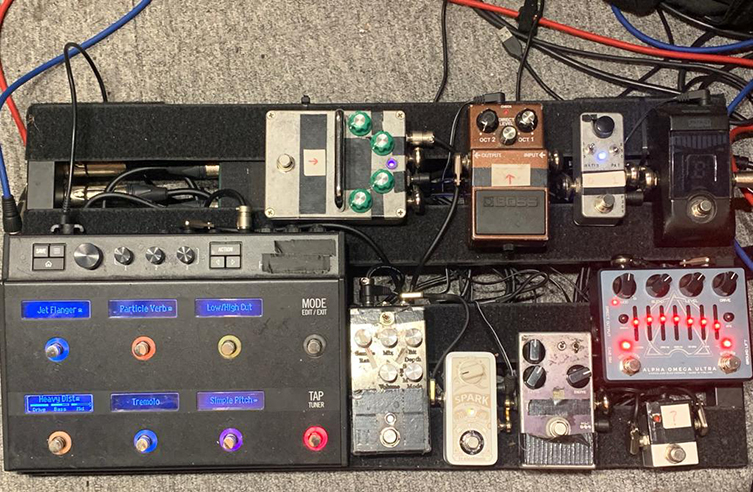
(Photo: James Rushforth)
Anyway, the ‘wet’ of that goes into a tiny little Mute pedal and that goes into two 212 Vanderkley cabs, and they are like 600 watts each with a 900 watt Tecamp Puma head. So that’s like half of my firepower there. I unmute that for the drops, so that’s like my supersub, floorshaking, fuck off levelling thing. And the Vanderklays are much more hi-fi and clear. I take the dry line and it goes into the BOSS OC-2 with all of the dry level dialled out, so at no point during the set am I playing actual bass. That goes into a Darkglass E7K Ultra. I don’t really like the distortion on that, it’s not that great, but then it goes into a B3K, another Darkglass distortion, which I bought so long ago, it’s such an old pedal now. It’s easily the best pedal: you only ever need a Darkglass B3K and you’ve completed bass tone. Fuck Sansamp, fuck everything! You don’t even need an amp: all the sounds that are live bass sounds are recorded with a Music Man through that Darkglass: that’s all you need. I don’t give a fuck what anyone says!
GG: I love it! It’s like: that’s all you need, but you’ve got by far the most complicated bass rig I’ve ever heard in my whole entire life. (James laughs) So bollocks to that! Now, I know you have even more gear, but the sad, horrible reality is that we are running out of time here! I do want people to know that your album is out tomorrow and I want to know how you feel about the ambition of it versus how it turned out. How do you feel about it? And the other question is: what’s happening next for SCALPING after the release?
JR: I personally feel like we worked on it for a long time to the point where we overanalysed things and there’s obviously stuff I’d change. I’m happy with the majority of it. I did calculate the exact amount of time that I don’t enjoy the album and it’s one minute and thirty seconds, which I hate. There is some of it that is unfinished. I do feel like there’s some things - especially with guitar - where we’re trying to shoehorn in stuff and trying to move away from that thing of being…it’s like what Nick said: you got to lose your ego and forget about you playing your part, it’s not about that at all. That’s really important. Generally, I’m pretty happy, I think we ticked all the boxes that we needed to tick and I like that it’s short. I wish more people picked up on that, because who the fuck wants ot listen to long albums? I don’t fucking know.
"It's a massive personal victory for us: next week, we're playing Fabric with 7-string guitars!" (Nick Berthoud)
NB: A big thing for the release - for all of us - as well, is just getting to put out an album as a whole band with guitars, on the Houndstooth label.
GG: Yeah, Fabric’s label.
NB: We’re the first band they’ve ever worked with. They had no idea about the process of working with a band when they started working with us, it was funny! That’s been quite a cool thing, to get out a guitar album on a label we love and respect from a completely different world.
GG: That’s a real achievement. But you know, you are the danciest metal band out there! It makes sense!
NB: Yeah, I still feel like that's always been the goal. That in itself, when we got the deal, was a massive personal victory for us, because next week we’re playing Fabirc with fucking 7-string guitars!
GG: What you’ve done is exceptional, and the short album means you just listen to it twice. So after the release, will you be touring a lot?
NB: Yeah, hopefully! The Fabric release show is the big thing we’re gearing up for, then festivals a bit round the UK and Europe. Some of that’s still being sorted at the moment. It’s a fucking wild world, post-covid! Three years of bands going for everything, isn’t it? But yeah, all of that is in the works or coming through.
JR: Sadly we’re not in control of stuff so we’re just grateful. But one thing that we’re all happy about is that, as you can tell from the amount of things we’re pulling from and the amount of things we listen to, we know that no one else is going to come along, because it took two years to make. This record took every ounce of my life, to be honest, and I made it when I was really sad and now I’m really happy and that’s great. I just know that when you come and see us live, no one else can provide when we can.
We did say they didn’t hold back, right? It was a real blast chatting to Nick and James. It’s obvious that they are currently riding a large and exciting wave, with music that feels like it looks forward instead of back to the usual rock reference points. At time of writing, their album Void will be available to listen wherever you get your music, and we highly recommend it: it’s an addictive, exhilarating experience to say the least. Head over to the official SCALPING site for merch and tour dates.
We’d like to thank James, Nick and James Crosley for their time and for giving us such an excellent conversation!
Thanks for reading this exclusive interview! If you enjoyed it, you’ll find well over a hundred more on our guitarguitar interview pages. There will be more soon!



